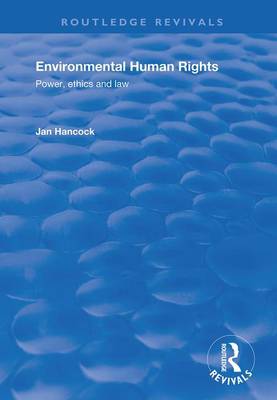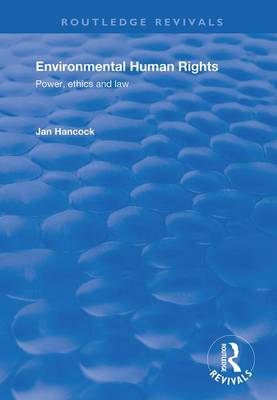
Door een staking bij bpost kan je online bestelling op dit moment iets langer onderweg zijn dan voorzien. Dringend iets nodig? Onze winkels ontvangen jou met open armen!
- Afhalen na 1 uur in een winkel met voorraad
- Gratis thuislevering in België vanaf € 30
- Ruim aanbod met 7 miljoen producten
Door een staking bij bpost kan je online bestelling op dit moment iets langer onderweg zijn dan voorzien. Dringend iets nodig? Onze winkels ontvangen jou met open armen!
- Afhalen na 1 uur in een winkel met voorraad
- Gratis thuislevering in België vanaf € 30
- Ruim aanbod met 7 miljoen producten
Zoeken
Omschrijving
This title was first published in 2003. Environmental Human Rights redefines the political, ethical and legal relationships between the environment and human rights to claim the human rights to an environment free from toxic pollution and to natural resources. Through a focus on the operational dynamics of social power, this compelling book details how global capitalism subjugates concerns of human security and environmental protection to the values of allocative efficiency and economic growth. The capacity of social power to construct ethical norms and to determine the efficacy of law is examined to explain how ethical and legal concepts have been selectively applied to accommodate existing patterns of production, consumption and exchange that cause environmental degradation and human rights violations. By looking at how environmental values have been systematically excluded from the human rights discourse, the book claims that human rights politics and law has been constructed on double standards to accommodate the destructive forces of capitalism.
Specificaties
Betrokkenen
- Auteur(s):
- Uitgeverij:
Inhoud
- Aantal bladzijden:
- 270
- Taal:
- Engels
- Reeks:
Eigenschappen
- Productcode (EAN):
- 9781138722408
- Verschijningsdatum:
- 31/05/2021
- Uitvoering:
- Paperback
- Formaat:
- Trade paperback (VS)
- Afmetingen:
- 150 mm x 216 mm
- Gewicht:
- 294 g

Alleen bij Standaard Boekhandel
+ 83 punten op je klantenkaart van Standaard Boekhandel
Beoordelingen
We publiceren alleen reviews die voldoen aan de voorwaarden voor reviews. Bekijk onze voorwaarden voor reviews.











